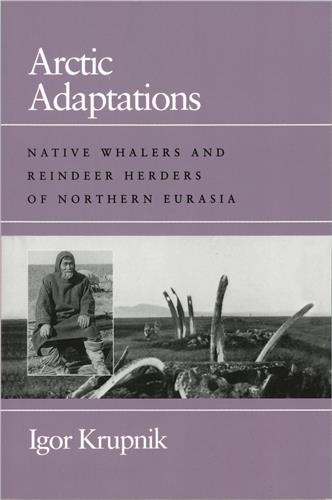A masterful study that will for the first time present English readers with cultures and environments of a totally unknown region. Krupnik is the most knowledgeable scholar of this subject in the world.
The common view of indigenous Arctic cultures, even among scholarly observers, has long been one of communities continually in ecological harmony with their natural environment. In Arctic Adaptations, Igor Krupnik dismisses the textbook notion of traditional societies as static. Using information from years of field research, interviews with native Siberians, and archaeological site visits, Krupnik demonstrates that these societies are characterized not by stability but by dynamism and significant evolutionary breaks. Their apparent state of ecological harmony is, in fact, a conscious survival strategy resulting from “a prolonged and therefore successful process of human adaptation in one of the most extreme inhabited environments in the world.” As their physical and cultural environment has changed—fluctuating reindeer and caribou herds, unpredictable weather patterns, introduction of firearms and better seacraft—Arctic communities have adapted by developing distinctive subsistence practices, social structures, and ethics regarding utilization of natural resources.
Krupnik’s pioneering work represents a dynamic marriage of ethnography and ecology, and makes accessible to Western scholars crucial findings and archival data previously unavailable because of political and language barriers.


A masterful study that will for the first time present English readers with cultures and environments of a totally unknown region. Krupnik is the most knowledgeable scholar of this subject in the world.
A leading figure in Arctic and Native Studies, IGOR KRUPNIK is a Visiting Fellow at the Arctic Studies Center of Smithsonian Institution and a Fellow at the Institute of Ethnology at the Academy of Science in Moscow. He is a founding council member of the International Arctic Social Science Association. MARCIA LEVENSON is a doctoral candidate specializing in the human geography of the Soviet Arctic at the University of California, Berkeley.

Founded in 1971, Brandeis University Press is a nonprofit publisher dedicated to publishing innovative, high-quality books for a general audience, as well as scholarship that advances knowledge and promotes dialogue in the humanities, arts, and social sciences around the world.
© Copyright 2024, Brandeis University Press
Brandeis University Press
Goldfarb Library 69-235, MS 046
Brandeis University
415 South Street
Waltham, MA 02453
(781) 736-4547
pressinfo@brandeis.edu

Stay up to date with the newest titles and promotions from Brandeis University Press—while saving 20% on your first purchase.